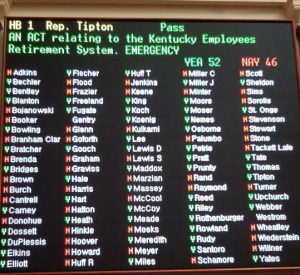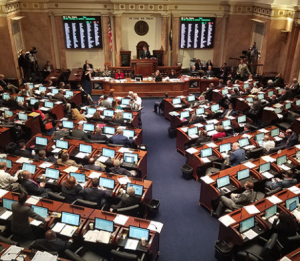By Tom Latek
Kentucky Today
Gov. Matt Bevin’s public pension bill to provide relief to regional universities, health departments and other quasi-governmental agencies made it over a critical hurdle on Monday when lawmakers of the Kentucky House narrowly approved the measure 52-46.
Lawmakers were in day three of a special session on the pension called by Bevin last week. The House vote followed over three hours of intense debate, with all House Democrats voting no, joined by nine Republicans. It came after a rare Saturday session, where the House State Governmental Committee advanced the bill on an 11-8 vote against the objections of Democrats and one Republican. Opponents warned it could cut benefits anticipated by thousands of public employees.

How they voted (Photo by Tom Latek/Kentucky Today)
Rep. James Tipton, R-Taylorsville sponsored the measure. He told his colleagues on the House floor Monday there are no good choices for them, but they must find relief for the situation these agencies face.
“We are trying to carve a path forward that will allow these agencies to remain viable, and in many cases, remain open.”
Tipton said the bill gave the agencies the most options. They could remain in the Kentucky Employees Retirement System or opt-out by paying off their unfunded liability either in a lump sum or by installments over 30 years.
Even if they opt-out, those agencies could let long-term employees (known as Tier I and Tier II) remain in the state retirement system and pay the employers’ contribution.
If they don’t, an alternative such as a 401-K would have to be offered to all employees.
Rep. Joe Graviss, D-Versailles, who sponsored two alternatives that were defeated in committee on Saturday, cautioned against approving the option which said if there was any remaining obligation after the 30-year payments, their slate would be wiped clean.
“That is binding future General Assemblies with financial obligations 30-years in the future,” Graviss said. “The actuaries reported $827 million in cost relief. That means there will be $827 million that will not go into the pension fund bank account, and that system needs cash fast.”
He also expressed concerns that the inviolable contracts entered into with employees of those agencies would be violated.
Rep. Jerry Miller, R-Louisville, said there has been fearmongering by those people who oppose the governor’s proposal, saying, “As politicians we all know, fear will generate money and fear will generate votes.”

House approved Gov. Bevin’s pension proposal by 52-46 vote.
But Rep. Mary Lou Marzian, D-Louisville, also spoke in opposition stating, “If this passes, teachers will be next, followed by state employees and retirees.”
Graviss offered two amendments that would remove a non-severability clause from the bill, which would mean if the courts strike down any portion of the bill, the entire bill would be struck down, forcing the agencies to pay nearly double their current pension contributions. But House Speaker David Osborne, R-Prospect, ruled that since non-severability was included in the Governor’s call for the special session, the amendments were out of order.
Another amendment, from Rep. Angie Hatton, D-Whitesburg, would eliminate most of the language of the bill, expect keeping a one-year freeze on pension costs to give more time to come up with a plan. But House Speaker David Osborne ruled that was also out of order because it did not address all of the items in the governor’s call.
Osborne also ruled that the bill was not an appropriations or revenue bill which would require 60 votes but, because it contained an emergency clause, meaning the legislation would take effect as soon as it is signed by the governor, it would take a constitutional majority of 51 votes for approval. They received one more than the required number.
The bill is headed to the Senate where it is expected to easily pass since they have a higher percentage of Republican members than the House. It received its first of three readings, which are required on three separate days, Monday afternoon.
Senate President Robert Stivers, R-Manchester, says he does not anticipate his chamber making any changes to the bill as it passed the House. “I think the way the call was set up, and the votes the governor has worked, that it will come out of committee Tuesday and be brought to the floor in the normal course of business on Wednesday.”
The Senate State and Local Government Committee meets at 10 a.m. on Tuesday to take up the bill.
Although it was a close vote in the House, Stivers adds, that won’t be the case in his chamber.
“I think we’ll probably have a few more votes on a percentage-wise basis than was done in the House.”
Even if it passes the Senate as expected, the controversy and battle over the issue may not be over.
Attorney General Andy Beshear, who is running for governor against Bevin, said Saturday the bill could be challenged in court because Bevin’s call was too restrictive since it included 12 provisions.
That, he feels, is dictating legislation to the General Assembly, which is a violation of the separation of powers section of the Kentucky Constitution.
A special session costs Kentucky taxpayers more than $66,000 per day.
















